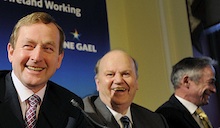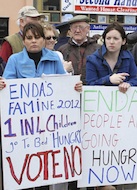
Taoiseach Enda Kenny told an unemployed man protesting against budget cuts to get a job, while his Employment Minister Richard Bruton revealed that a referendum re-run has already been considered, in a series of embarrassing campaign gaffes by Fine Gael's leadership this week.
Although the ‘Yes’ campaign is still ahead in the polls for this month’s referendum on the EU Austerity Treaty, Kenny’s outburst in Athlone, County Westmeath was seen as a possible sign of the wheels coming off their campaign.
Mr Kenny was confronted by members of the public during an ill-advised walkabout in the midlands town as campaigning intensified. A father-of-three accused Taoiseach Enda Kenny of forcing emigration on his three children.
“Back in 1958 I was forced out of this country. You are now forcing my children and my grandchildren out of this country,” said Peadar Doyle.
“I’m not forcing anybody out,” Mr Kenny responded, “don’t make a charge like that on me.”
Mr Doyle’s son, Simon, works in Wales, his other son Richard, who is in college in Waterford, is considering emigrating, and now he fears his daughter Mary may also have to leave after she completes her Leaving Certificate this year.
Kenny appeared to lose his temper as he was confronted again and again in the shopping centre.
Anne Heneghan asked: “How many more have lost their jobs and their homes because why, because the government can’t stand up to Europe?”
Another unemployed protestor who had been self-employed for 29 years but had to “pack it in” because of government cuts was targeted for ridicule by the Taoiseach.
“You could do with a day’s work,” was Kenny’s snide comment to anti-austerity campaigner Gordon Hudson.
NO TO EMIGRATION, NO TO HUNGER

Among the other protests the Taoiseach faced this week as he travelled the State was in Drogheda, where the annual Famine commemoration was taking place.
Kenny told the gathered dignitaries at the event in Drogheda that Ireland is “working to address the root causes of hunger and has become a leading global advocate in the fight againsthunger.
“This is a key aspectof the National Famine Commemoration,” he said. This year’s event took place at the County Louth port which saw the highest flow of hungry emigrants leave Irish shores.
But Kenny was forced to pass a picket of demonstrators against the hunger and emigration that has returned to Ireland.
Their protest followed news that a Cork schoolboy had fainted from hunger in a primary school classroom recently due to his mother’s inability to pay for food.
Brendan Dempsey, the head of St Vincent de Paul in Cork, said increasing numbers of Irish citizens are going hungry.
“I have seen it twice in the past nine weeks where adults have had weaknesses from a lack of food. I think in the future we will start to hear cases of children in similar situations,” he said.
“It used to be the case that people came to use for help to buy shoes or pay an [electricity] bill. Now they are coming to us for help to buy food,” Mr Dempsey said.
‘IRELAND IS NOT GREECE’
Later in the week, Finance Minister Michael Noonan blundered his way through an address at an economic summit in Dublin organised by Bloomberg.
Noonan dismissed the effect of the austerity crisis in Greece on Ireland with a quip that feta cheese is that nation’s only exported product.
Tens of thousands of Greek pensioners are being forced to queue at soup-kitchens, but the Greek people are now on the cusp of electing a strong left-wing government opposed to Europe’s austerity agenda.
The rise of anti-bailout parties in Athens has triggered a crisis for international bankers, who face unknown losses if Greece fails to repay all its debts.
A sniggering Noonan told business executives on Wednesday that events in Greece had no bearing on Ireland. “If you go into the shops here, apart from feta cheese, how many Greek items do you put in your basket?,” he said.
He also boasted: “There isn’t a country of the 17 euro countries at present who could carry this in a referendum, there isn’t a single country bar Ireland.”
Noonan’s admission came as polls showed support for the EU fiscal austerity treaty running at around 37% to 24% -- thanks to the government’s strong control over the main national print and broadcast media.
Kenny this week finally ruled out participating in a referendum debate planned by Ireland’s only indepedent television channel, TV3, ignoring accusations that he “ran away” from a head-to-head debate with Sinn Fein leader Gerry Adams. It is understood that his decision was based on a fear that he might repeat some of the slip-ups that have led his party to be dubbed ‘Fine Gaffe’.
‘CAN WE VOTE AGAIN?’
But perhaps the biggest campaign mistake so far was Employment Minister Richard Bruton’s direct statement that the coalition government planned to re-run this month’s referendum in the case of a ‘No’ vote - so that it can secure a further EU bailout.
During the debate on Today FM radio, host Matt Cooper asked Mr Bruton what he would say to Ireland’s European counterparts in the event of a ‘No’ vote.
“I suppose we will have to say that we will need access to this [European bailout fund], and I think Ireland will be looking to say can we vote again because we will need access to this fund,” Mr Bruton said. The shame-faced Employment Minister later said his comments were a mistake.
Sinn Féin TD Pearse Doherty has described the remarks as “outrageous”. Deputy Doherty said the mask had slipped and that the government was intent on bullying the people into accepting a treaty that is detrimental to their interests.
He said: “This government had to be threatened with legal action in order for it to announce a referendum. We now face the prospect of it not respecting the outcome of that referendum. This is the level of respect the government has for the people.”
NO CASH?
Bruton’s apparent slip of the plan for a second referendum and a second bailout recalled predictions made earlier this month by Fine Gael officials that the “frighteners” could soon be put on the Irish electorate.
One government strategy to ensure the passage of a second referendum later in the year may be to hold it in the context of the state ‘running out of money’.
Government ministers have previously outlined a scenario in which Irish ATM machines could run out of Euros unless EU funds are made available to the State.
One town in Monaghan has already found their own solution to the liquidity crisis facing communities across Ireland. The people of Clones have resorted to using the old Irish ‘punt’ notes and coins to generate cash-flow for the town’s shops and small businesses.
However, a reversion to a national currency has been repeatedly ruled out by the Dublin government as it could lead to a decline in the value of Irish assets relative to the eurozone. A return to the ‘punt’ has also been strongly opposed by the state’s upper classes and industries which benefit from the State’s eurozone membership.
VOTE TO DELAY?
The issue of the timing of the treaty ratification was to the fore in campaigning this week. There have been amid renewed calls for a postponement of the referendum vote and/or the ratification of the treaty. The deadline for the ratification of the Treaty is January next year.
Irish Congress of Trade Unions (Ictu) leader David Begg said François Hollande’s victory in the French presidential election meant “the tectonic plates have shifted again” in Europe, and, as a result, Ireland should wait until later in the year before ratifying the treaty.
A number of political and community organisations have also backed the ‘No’ campaign. They pointed to the ongoing negotiations between France and Germany and what they say is an emerging consensus across Europe that austerity has failed.
Libertas leader Declan Ganley, launched his organisation’s campaign this week against the Treaty. The prominent right-wing businessman, who played a major role in previous Irish referenda, argued that a ‘No’ vote would help Ireland secure a better deal in the negotiations on its bank debts.
RSF LAUNCH
Republican Sinn Fein launched their campaign against the referendum on Tuesday. They urged people to vote ‘No’ as a way of showing their determination to live up to the ideals of the 1916 Proclamation.
Party president Des Dalton said the treaty was the creation of the same political and financial elites responsible for the current economic collapse.
“During the so-called boom, the profits of the wealthy were privatised to ensure they would not be shared with society, now during the bust they are socialising their losses, forcing people across the EU to pay for them,” he told a press conference in Dublin.
Mr Dalton said the referendum gave Irish people the opportunity to add their voice to a growing European movement of resistance by voting No.
He called for a radical change in thinking through the creation of real economic and political democracy: “This means ensuring that the decisions which affect people and their communities are made by them rather than unelected and unaccountable bureaucrats in Brussels or elsewhere.”
![[Irish Republican News]](https://republican-news.org/graphics/title_gifs/rn.gif)
![[Irish Republican News]](https://republican-news.org/graphics/title_gifs/harp.gif)

